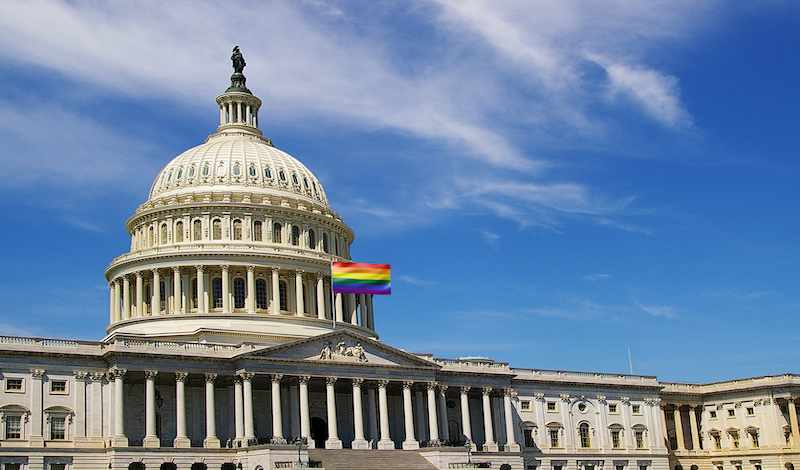
Without concrete data-reporting requirements, child welfare laws cannot adequately protect LGBTQ+ foster youth.
LGBTQ+ foster youth are among the nation’s most vulnerable youth.
Recent studies reveal that LGBTQ+ youth, and especially LGBTQ+ youth of color, are overrepresented in the child welfare system. Although LGBTQ+ youth enter foster care for a variety of reasons, many enter the system due to family rejection related to their sexual and gender identities. After entering foster care, LGBTQ+ youth are at greater risk than the general foster youth population of experiencing housing and school instability, mistreatment and abuse, and other negative outcomes including homelessness.
Federal regulations play a key role in helping to track and serve the over 400,000 youth who are in foster care at any given time in the United States. The Adoption and Foster Care Analysis and Reporting System (AFCARS) is a key example. AFCARS requires state child welfare agencies to collect and report certain demographic information for each child who enters foster care or is adopted in state child welfare programs. AFCARS data are used for many important purposes. These purposes include administering billions of dollars in federal funding every year to state child welfare programs and informing the development of child welfare laws, policies, programs, and services.
Under AFCARS, state child welfare agencies are not required to collect or report demographic data on sexual orientation, gender identity, or gender expression.
But in 2016, under the Obama Administration, the U.S. Department of Health and Human Services’ (HHS) Administration for Children and Families (ACF) unveiled a final rule that would have required state child welfare agencies to collect and report important LGBTQ+-related data under AFCARS. The rule included several notable provisions: voluntarily self-reported data on sexual orientation for youth age 14 and older; voluntarily self-reported data on the sexual orientation of foster parents, adoptive parents, and legal guardians; and any evidence of family conflict related to a youth’s sexual orientation, gender identity, or expression upon entering the child welfare system.
ACF noted that the new LGBTQ+-related data requirements were intended to “better support children and youth in foster care who identify as LGBTQ+ and ensure that foster care placement resources and services are designed appropriately to meet their needs.” ACF further commented that it considered and rejected concerns raised in public comments that sexual identity was too sensitive or private for youth to report to their caseworkers. It stressed that if LGBTQ+ youth “do not feel comfortable disclosing such information, they may decline to report the information.”
To provide states with ample time to implement the changes, the 2016 final rule was poised to take effect on October 1, 2019. Under new leadership during the Trump Administration, however, HHS took several regulatory actions that were designed to prevent these important changes from ever taking effect.
Starting in March 2018, ACF published a notice of proposed rulemaking that delayed the implementation of the final rule by two years. In a separate advance notice of proposed rulemaking, the Children’s Bureau of HHS announced that ACF was seeking public comment to streamline AFCARS data elements. Then, in August 2018, the Children’s Bureau unveiled yet another new rule that delayed the effective date of the 2016 final rule by another year.
Several months later, ACF took even bolder action—proposing the elimination of the requirement that states collect and report data on the sexual orientation of youth age 14 and older, foster parents, adoptive parents, and legal guardians. ACF noted its intent “to reduce the AFCARS reporting burden” and its agreement with concerns stated in public comments that sexual identity was too “sensitive and private” to report “in a government record.” This position was a full reversal from HHS’s prior position during the Obama Administration.
Finally, in May 2020, ACF unveiled a wholly new final rule that eliminated these sexual orientation data reporting requirements from AFCARS altogether and further delayed the effective date for the remaining amendments in the 2016 final rule to October 1, 2022.
The recent regulatory erasure of LGBTQ+ youth from AFCARS data collection is harmful on several levels. First, this regulatory erasure inhibits accurate estimates of how many LGBTQ+ youth enter foster care and whether LGBTQ+ foster youth experience certain negative outcomes at greater levels than non-LGBTQ+ youth. In particular, the lack of LGBTQ+-related data under AFCARS limits public understanding of the intersectional challenges and experiences of LGBTQ+ foster youth of color, who are especially overrepresented in the child welfare system.
Second, this regulatory erasure frustrates the ability of child welfare agencies to develop and improve programs and services that reach LGBTQ+ foster youth. Such programs and services include LGBTQ+ competency training for providers, staff, and foster parents so that those actors can identify and appropriately respond to the challenges that LGBTQ+ youth commonly face in the child welfare system.
Third, this regulatory erasure frustrates the ability of child welfare agencies to obtain funding for programs and services that are geared toward LGBTQ+ foster youth. As noted, AFCARS data are commonly used to determine the extent to which child welfare agencies are eligible for federal funds.
Finally, this regulatory erasure inhibits the development of child welfare laws and policies that would improve outcomes and services for LGBTQ+ foster youth. Without this information, it is difficult to know which law and policy measures best serve LGBTQ+ foster youth. It is also difficult to persuade lawmakers and the public at large that legal changes are necessary to ensure that those measures are in place.
The harms of the recent AFCARS regulatory changes have not gone unnoticed by scholars and advocates. In August 2020, LGBTQ+ youth groups joined a coalition that filed a lawsuit in federal court challenging HHS’s 2020 final rule as a violation of the Administrative Procedure Act. Recently, 28 members of Congress filed an amicus brief in support of the coalition’s lawsuit.
HHS under the Biden Administration could decide to rescind the 2020 final rule or these issues might ultimately be resolved by the courts. Regardless, the recent regulatory erasure of LGBTQ+ foster youth from AFCARS data collection remains a powerful example of how regulation touches the lives of LGBTQ+ people, and especially vulnerable segments of the LGBTQ+ population.
This essay is part of a 9-part series, entitled LGBTQ+ Rights and Regulation.




